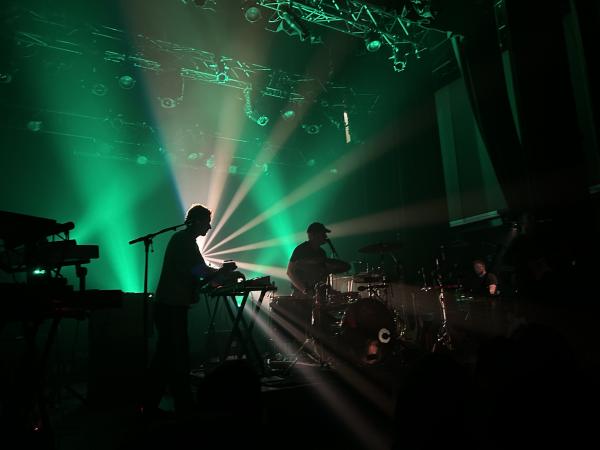Squid @ Club Soda

Post-punk is a very broad genre of music. After emerging from punk in the late 70s in the United Kingdom, it saw punk rock mixed with several other elements from different genres that were unconventional within the punk context.
In the band Squid’s case, it is easy to hear some math-rock/midwest emo influences with the presence of odd time signatures and glassy guitar tones throughout most of their songs. Their use of bass and lead synths, seen throughout both of their albums, Bright Green Fields and O Monolith, provide a constant ambience to their music while their drummer and lead vocalist, Ollie Judge, keeps a tight groove and provides an ecstatic vocal performance. Judge's vocals are very punk-reminiscent, with heavily distorted screaming that adds deep emotion and tone to each song.
However, there is nothing else consistent about the band. In fact, Squid’s charm comes from their inconsistency as, safe for Ollie and the band's keyboardist Arthur Leadbetter, other bandmates Anton Pearson, Laurie Nankivell, and Louis Borlase, are constantly switching the instruments they’re playing. Both Leadbetter and Pearson often shift between guitar and bass, while Pearson also works the synth and his guitar pedal knobs to provide ethereal embellishments and presence to their music. Laurie, although primarily their bass player, also works the trumpet excellently throughout songs such as “Documentary Filmmaker” and “After the Flash,” and Leadbetter mainly works the keyboard, while occasionally picking up the cowbell, tambourine, gong, and some stringed instruments.
It is an understatement to say that the band is extremely diverse, and they take advantage of their vast musical knowledge to constantly create something new. All of this makes it possible for Squid to create beautiful ambient melodies that either precede, follow or merge into gritty and groovy punk rock segments.
While Squid’s music is highly ambitious, incorporating versatile layers of sound feeling like they could fall apart at any moment, it is exactly that organized chaos that led to their performance at Club Soda feeling like a seamless transition from listening to them on record.
Opening with their song “Swing (In a Dream),” the band members' sheer musical talent and professionalism was demonstrated with how well executed each nuance that makes the album version sound so great, as well as the whole concert being one of the most well-mixed shows I’ve been able to attend in recent months. This combined perfectly with the countless moments of live improvisation that the band would include, each being vastly different from the other.
Squid performed some of their first hit songs which first began putting them on the post-punk map including “The Cleaner” and “Narrator” and many off their new sophomore release, O-Monolith, but a surprising portion of what was played were deeper cuts off their earlier EPs. One of these deeper cuts being the track “Broadcaster” where Judge steps off his kit and performs with a microphone directly in front of the crowd, providing excellent stage presence as he wandered around the stage with a completely different personality, where instead of looking focused and calculated on the drums he could fill the song with a playful and intimate atmosphere.
Ending the setlist by performing “The Blades” was an unbelievable musical moment that I’ll remember very fondly and kept up the momentous energy that could be felt throughout the entire show. While many of the fans in the audience chanted for an encore since they had yet to play “Pamphlets” which had been a staple at many of their prior shows, they unfortunately did not, which gave some slight disappointment but left me knowing that I would undoubtedly attend their next concert and I highly recommend anyone who enjoys watching expertly played live music to do the same.




